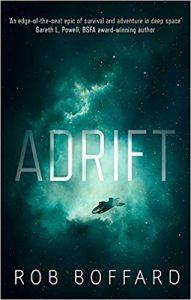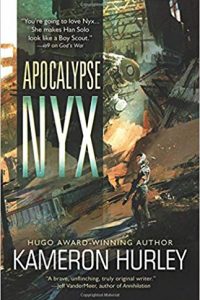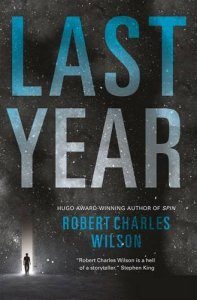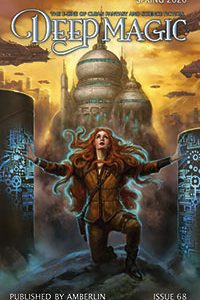Liz Bourke Reviews Adrift by Rob Boffard
 Adrift, Rob Boffard (Orbit 978-0356510439, £8.99, 400pp, pb) June 2018.
Adrift, Rob Boffard (Orbit 978-0356510439, £8.99, 400pp, pb) June 2018.
Adrift is Rob Boffard’s fourth novel and the first piece of his that I’ve read, and it makes me think I’ve been missing out by not noticing his work earlier. This is a strong, well-written effort with an ensemble cast and a solid science fictional setting.
Sigma Station used to be a mining station, but with the end of the war between the Earth-based Federation and the Colonies, it’s become a luxury resort, the ultimate holiday destination in the outer reaches of space, near the Horsehead Nebula.
Hannah Elliott has come to Sigma Station for work. She wants to be a museum professional, but the only job she’s managed to get is as a Sigma Station tour guide. It’s her first day, and things aren’t going so well when she shows up to guide a shuttle group out for a trip to view the Horsehead Nebula up close.
Corey Livingstone is on holiday with his parents – his mother works for a Federation politician, his dad’s an engineer of sorts – and his teenage elder brother, camera-geek Malik. Corey’s fascinated by ships and wants to own a shipbuilding company with his two best friends when they all grow up. But his holiday isn’t going so well: his parents keep fighting with each other, and he feels like his brother is ignoring him.
Jack Tennant is an alcoholic screw-up, a former serious journalist turned tourism correspondent. He’s drowning memories of his lover Hector – their relationship collapsed when Hector, a police officer in South America, suffered a serious injury that meant he would spend months or possibly years in treatment before he could walk again – and behaving like a self-absorbed asshole.
Hannah, Tennant, and Corey are the novel’s core viewpoint characters. Along with Corey’s family, an older woman called Lorinda Esteban who used to be an asteroid miner, a couple – Brendan and Seema – who are more than they appear, and Volkova, an ex-military Russian pilot with a stash of vodka and a take-no-shit attitude, they’re all aboard a small shuttle on a daytrip to view the Horsehead Nebula when something horrifying happens: an unknown military craft using advanced weaponry launches an attack on Sigma Station, resulting in its destruction and the slaughter of everyone in the vicinity. The shuttle carrying Adrift’s main cast only survives because Volkova is a badass pilot who really doesn’t want to die.
Although they survive the first attack, there’s no way around the fact they’re stuck in a tin can in space with limited water and air, and with practically no food. There’s very little chance of rescue, and almost certainly no way home – and worse, the ship that destroyed Sigma Station is still out there.
The people aboard the shuttle aren’t professionals. Most of them have only just met each other. They’re traumatised, terrified for their lives, and – at least initially – strongly in denial about what’s happened, and what is still happening, to them. The fault lines in the group mean that their internal conflicts pose as much of a threat to their survival as any external danger.
Boffard presents a tense, tight, extremely claustrophobic novel. The sense of being caught in the jaws of an inexorably closing trap is inescapable. The characters’ attempts to improve their situation don’t go completely wrong, but each of their efforts – even when one of them doesn’t screw things up entirely – only succeeds in keeping them going just a little further, just sufficient to get them past the most immediate threat. The pacing works very well, as things get more and more strained and as members of the ensemble start to become seriously injured or die. (Since I’m someone who keeps track of this kind of thing: at the outset there are five women and five male people alive on the shuttle. By the end, three of the women have died and the male people are pretty much as alive as they were at the beginning.)
Boffard’s characters are sketched in strong outlines. Hannah is a very believable young woman, thrown into a position that leaves her with far more responsibility than she’s really ready for, trying her best to keep on top of things. Jack is a deeply unlikeable ass, but an ass who manages to learn and change, at least a little, in the course of the narrative. And Corey’s a kid – a good kid, clever, curious, appropriately naive – and probably the most compelling of the viewpoint characters. Of the secondary members of the ensemble, Corey’s parents are ciphers, and I really wanted to see more of Volkova and Lorinda, who come across as strong and capable presences.
I’ll quibble a little with Boffard’s worldbuilding: his vision of the future is fairly conservative in its general outlines, hewing quite close to a mainstream vision of US or UK society today, albeit projected into a future with a spaceships and more inhabited space. A little more inventiveness is often desirable.
All told, though, this is a very entertaining and enjoyable novel, one that kept me engaged right up until the final pages. If you’re looking for a space thriller, I can recommend this one.
Liz Bourke is a cranky queer person who reads books. She holds a Ph.D in Classics from Trinity College, Dublin. Her first book, Sleeping With Monsters, a collection of reviews and criticism, is out now from Aqueduct Press. Find her at her blog, her Patreon, or Twitter. She supports the work of the Irish Refugee Council and the Abortion Rights Campaign.
This review and more like it in the August 2018 issue of Locus.
 While you are here, please take a moment to support Locus with a one-time or recurring donation. We rely on reader donations to keep the magazine and site going, and would like to keep the site paywall free, but WE NEED YOUR FINANCIAL SUPPORT to continue quality coverage of the science fiction and fantasy field.
While you are here, please take a moment to support Locus with a one-time or recurring donation. We rely on reader donations to keep the magazine and site going, and would like to keep the site paywall free, but WE NEED YOUR FINANCIAL SUPPORT to continue quality coverage of the science fiction and fantasy field.








